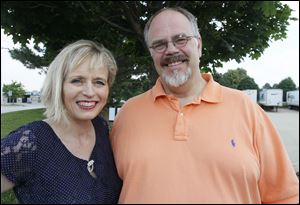
A new address for former Springfield Township co-pastors now in Gettysburg
7/19/2014
The Zimmanns recently returned from a missionary posting in Jerusalem.
The Revs. Angela and Martin Zimmann are back in the United States.
In February, 2013, they moved to Jerusalem from their home in Springfield Township, intending to be there for a four-year assignment. They were serving as co-pastors to the English-speaking congregation at the Church of the Redeemer and as special assistants to the bishop of the Evangelical Lutheran Church in Jordan and the Holy Land. They returned June 25, primarily for family reasons.
When the Zimmanns accepted the call to Jerusalem, Angela Zimmann, the 2012 Democratic candidate for the 5th Congressional District seat who was defeated by incumbent Rep. Bob Latta (R., Bowling Green), said, “I don’t know where this will lead.”
It led to Gettysburg, Pa., to a position as an advancement and communications executive and a teacher of preaching at Lutheran Theological Seminary at Gettysburg. Martin Zimmann will be the minister for a congregation in that area. Both Zimmanns are 1998 graduates of the seminary. They have already moved into a house on Gettysburg’s campus.
“When we were getting ready to leave,” Angela Zimmann said, “the message my Palestinian Christians had was, ‘We’re going to miss you, but please go back and tell our story. We don’t need you to sit here for three more years under occupation with us. We need you to go and tell the story.’”
The story has many angles. Christians, Muslims, and Jews all live in that place important to all three Abrahamic religions, with politics ancient and modern affecting geography and daily life.
Hostilities between Israel and Hamas were building when the Zimmanns left; three Jewish teenagers had been kidnapped and killed. Their bodies were found June 30, and Israel would soon direct increased military action to the West Bank. “Religion is not the problem in the Middle East,” Martin Zimmann said. “It can be a catalyst which causes problems, but it is not the problem. The problem is political. The problem is people use religion as a means of expediting their own political agendas.”
Martin Zimmann said that for people in the U.S. interested in Middle East activism, “I would encourage them to continue to hold the people of the holy land in prayer and continue to document and witness what is happening there. It’s so much easier for us to continue to be focused on the kingdom of the self than to be aware of the suffering of our neighbors. … There needs to be a grassroots voice if there is ever truly going to be peace in the holy land, and that’s going to be in conjunction with paradigm shifts presented by population growth, infrastructure needs, and climate change. Necessity is going to be the mother of invention if peace is going to come to the Middle East, I think.”
In addition to talk of peace and war, and their Palestinian colleagues, the Zimmanns spoke about being Christian ministers in the home of their faith.
“When Angela and I first arrived, there was a certain awe that we carried with us” as they saw biblical and historical sites, Martin Zimmann said. “But then we were like, ‘So, OK, where do we go to get eggs and milk?’”
And there were some less-than-holy-land experiences, such as encounters with tourists. Angela Zimmann was the only female minister working in Jerusalem‘s Old City, they said, and the Zimmanns were visible in their clergy-collar shirts. Some people laughed, others pointed, and many asked to take pictures, they said.
And as a woman pastor, she was a minority figure in a minority religion there—only two percent Christian, she said. “When 98-plus percent of the people believe something else, you have to be able to justify at least to yourself why you’re not part of that 98 percent.”
But they were continually reminded that they worked in a sacred place. “Literally every Sunday in our church, our congregation, there were people visiting from all over the world,” Martin Zimmann said, “and they still had that fresh patina of awe and wonder. It helped me remember that, yes, you’re serving in this place which is not only a geographical entity but also symbolic of so much more. People really pin their hope that the world is not lost but that something miraculous happened here, and someday may happen again.”
“Every time a delegation would come to visit,” Angela Zimmann said, “they’d say, ‘Oh my gosh, it’s so amazing that you get to serve here.’” She said she always reminded the visitors that “the Gospel is the Gospel and the work of Christ is the work of Christ regardless of the physical location.” She would remind them of the Christian “Great Commission,” to “teach all nations, baptizing them,” as Matthew 28:19 says. “I’ve said the ministry you’re doing in Montana, in Canada, in Switzerland, in wherever you’re located is absolutely as close to God and important and valuable as what anyone is doing, particularly in Jerusalem.”
Even so, Jerusalem remains special. “Why couldn’t Jerusalem be like the Vatican, its own little place?” Angela Zimmann asked. “A separate entity unto itself, for everyone in the world? … If it could be spared the conflict of the surrounding lands and just be an enclave of ‘this is a holy place’ … It’s not going to happen but that’s my dream, that it would be that way.”
Contact TK Barger @ tkbarger@theblade.com, 419-724-6278 or on Twitter @TK_Barger.